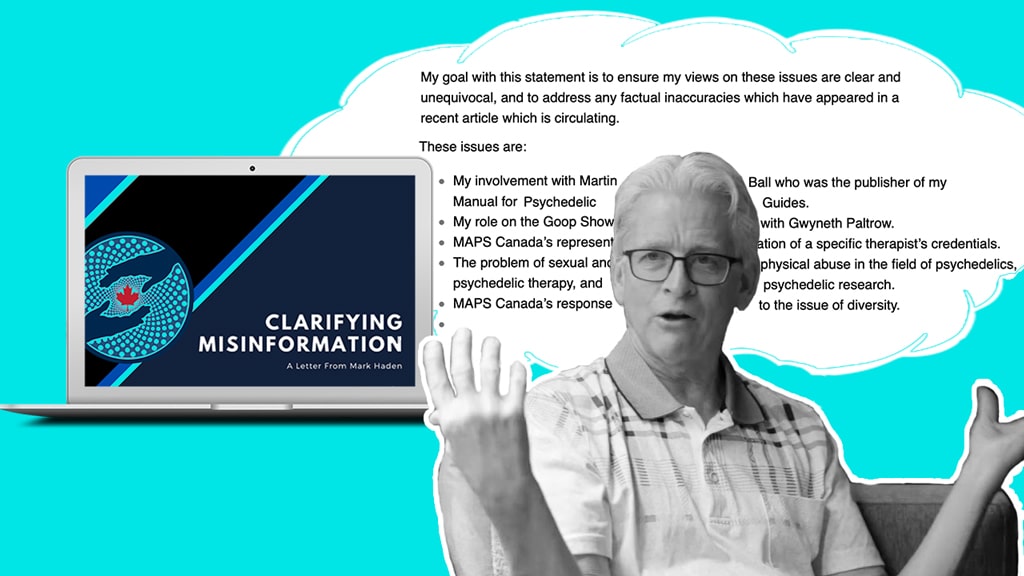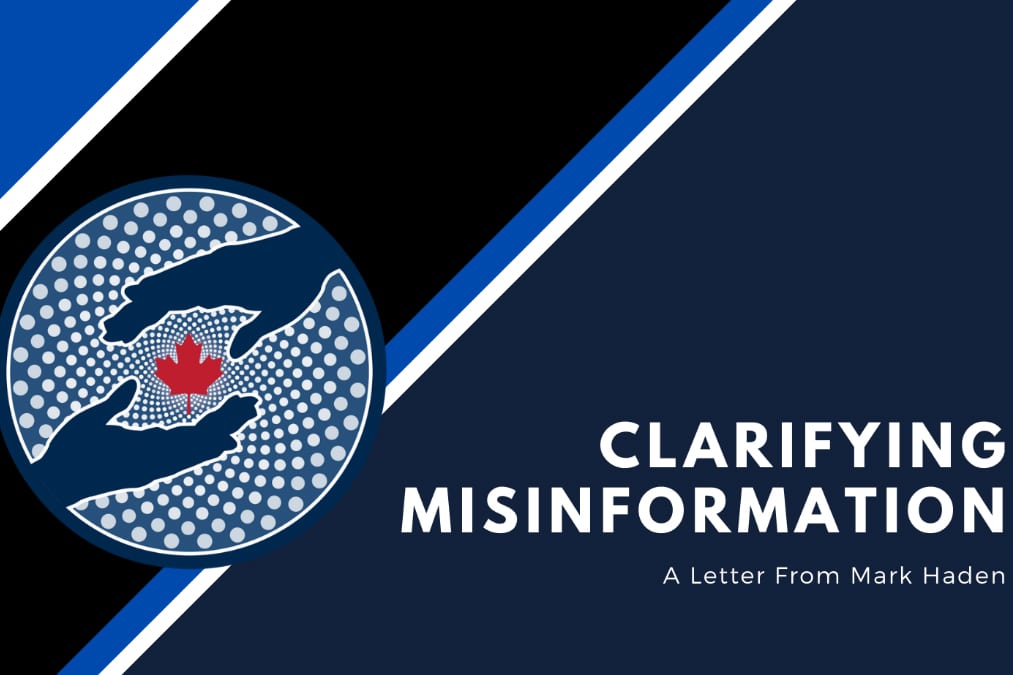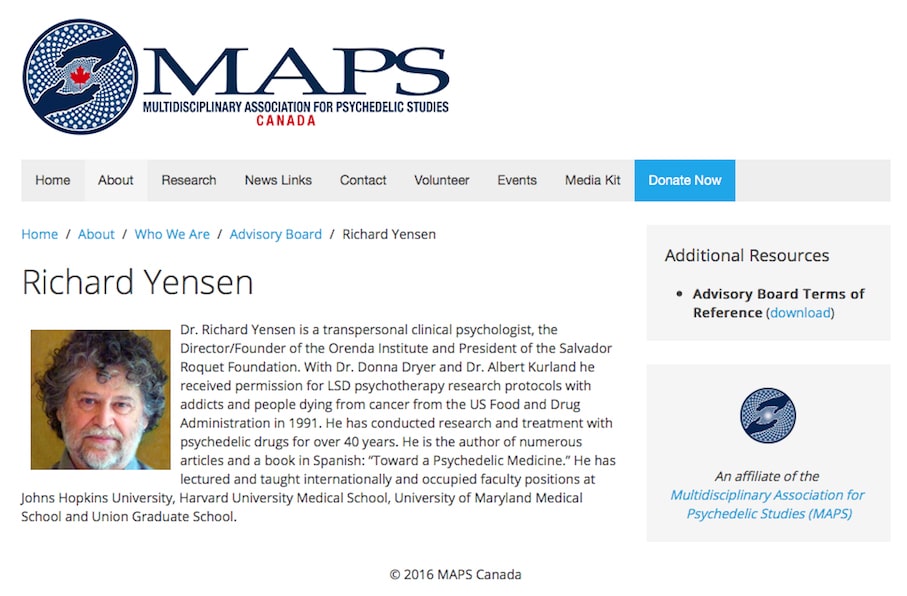
MAPS Canada’s “Clarifying Misinformation” Letter by Mark Haden is Full of Misinformation
In response to Psymposia’s reporting on outgoing MAPS Canada Executive Director Mark Haden’s resignation following a year full of controversies, Haden published a statement entitled “Clarifying Misinformation” that was full of misinformation and factual inaccuracies. In the following article, we set the record straight.

Psymposia is a 501(c)(3) nonprofit research and media organization that offers critical perspectives on drugs, politics, and culture. We rely on contributions from our readers and listeners. Your support is vital to sustaining Psymposia.
Support Psymposia’s independent journalism on Patreon and help us drive the Mystery Machine! We’re a bunch of meddling kids who are unmasking the latest shenanigans on the psychedelics beat.
Over two weeks after the publication of Psymposia’s February 19 article—After a Year of Controversy, MAPS Canada Executive Director Mark Haden Announces Resignation—Haden published a statement through the official MAPS Canada newsletter, entitled “Clarifying Misinformation,” in which he spread demonstrably false information.
Haden described the March 10 email as his final opportunity to address issues raised during his tenure at MAPS Canada, before his transition to psychedelic manufacturer Psygen. But, in reality, the email appears to offer public relations spin in an attempt to discredit Psymposia’s reporting, which was based on facts that were cross-referenced with other reporting, public statements, and documents.
“My goal with this statement is to ensure my views on these issues are clear and unequivocal, and to address any factual inaccuracies which have appeared in a recent article which is circulating,” Haden writes, without naming or linking to the article in question.
Following this assertion, Haden appears to use the allegation of “factual inaccuracies” to soften his admission that it was inappropriate to endorse Dr. Martin W. Ball by involving Ball in his book, Manual for Psychedelic Guides, as a writer, editor, and publisher. By removing Dr. Ball from the book, Haden acknowledges including him reflects poorly on the Manual, given that Dr. Ball has publicly admitted to vomiting on clients, touching their genitals, and inserting his fingers down their throats, all while both he and they were under the influence of 5-MeO-DMT.
Haden claims that he was not aware of the “bizarre practices of [Ball’s] historical guidework” and that he has “made the decision to republish the Manual for Psychedelic Guides, removing any reference to Ball to make it very clear that I do not endorse the behaviours described in the video” [link added]. On his podcast, The Entheogenic Evolution, in an episode entitled “Psymposia and the Treachery of Images,” Ball stated that Haden brought on help from a public relations consultant who recommended the removal of Ball from the book. Psymposia asked Haden twice if this was true, but he declined to answer.
In defense of his initial decision to recruit Ball as editor and publisher of the book, Haden states, “The reason I chose him for the role of publisher was because I have read a number of his books, and all of them were well written, and in a style that is similar to my own…None of his books that I read described any disturbing or unethical practices and at no point were his past practices discussed with me.”
This statement raises questions as to whether Haden is intentionally misrepresenting the facts or just negligent.
Haden’s Manual for Psychedelic Guides, lists Ball’s Entheogenic Liberation: Unraveling the Enigma of Nonduality with 5-MeO-DMT Energetic Therapy (The Entheogenic Evolution Book 8) as “Suggested Reading.” In this book, Dr. Ball states, “In rare cases, the energy may be so demanding that you are required to purge directly onto the client. Though this sounds perfectly awful, you can trust that if it occurs, it is what the client needs in that moment and will be appreciated.” Ball also details every other practice listed in Psymposia’s original reporting in this book, which includes a chapter subheading simply titled “Genitals.”
Following Haden’s announcement that he had removed all references to Ball from the Manual, Psymposia purchased a copy of the Manual online and received a copy with Ball’s name still on the cover and Entheogenic Liberation in the “Suggested Reading” section.
Psymposia reached out to Haden regarding which books of Ball’s he has read—noting that Ball’s “bizarre practices” are detailed in one of the suggested books in the Manual. Haden reiterated that he was unaware of Ball’s practices and “all the practices I endorse are discussed in my book.” Haden ultimately declined to indicate which of Ball’s books he has read, despite his prior statement that he found a number of them to be “well written, and in a style that is similar to my own.”
In his letter, Haden also offers his perspectives on the matter of Richard Yensen and Donna Dryer: two former MAPS Canada therapists who are alleged to have been involved in sexually abusing a clinical trial participant and then covering it up.
Haden states, “In 2018, MAPS USA contended with ethical violations of inappropriate sexual behaviour by a research therapist. This involved a subject at the Vancouver study site, and occurred after completion of the phase 2 trial for MDMA-assisted psychotherapy for PTSD.”
However, according to a “Notice of Civil Claim” filed against Richard Yensen and Donna Dryer, “In or about fall of 2015…the Plaintiff’s psychological condition deteriorated significantly and severely as a result of the acts and/or omissions of the Defendants and the treatment provided to the Plaintiff.” And, a “Response to Civil Claim” filed by Yensen states, “An intimate and sexual relationship (‘the Intimate Relationship’) between the Plaintiff and Dr. Yensen commenced in or about February 2016…”
According to the MAPS website, the phase 2 trial was officially completed on November 27, 2016. This means that Yensen acknowledged that he engaged in sexual behavior with a clinical trial participant during the phase 2 trial, a fact which Haden ignores in order to assert that the behavior in question “occurred after completion of the phase 2 trial.”
In response to inquiries about this contradictory information, Haden wrote that “all communication regarding Yensen and Buisson is handled by MAPS USA – I would suggest you contact them for information” (even though he wrote and signed the MAPS Canada newsletter which presented the incorrect information).
In his newsletter, Haden goes on to claim that “MAPS USA reported the violations as soon as they became aware of them to MAPS Canada, the US FDA and Health Canada.”
However, according to reporting by Olivia Goldhill in Quartz, “Buisson said she first reported the sexual allegations in January 2018, to MAPS’ director of strategic communications Brad Burge; in an email to Quartz, Burge denied that Buisson reported ‘any sexual experiences with her therapists to me or to MAPS’ at that time….MAPS said it first learned of Buisson’s experiences nine months later, when she informed Michael Mithoefer, a clinical investigator for MAPS’ MDMA studies, of her complaints in October 2018.” Burge has since left MAPS.
In response to Psymposia’s questions about the swiftness of MAPS’ reporting of violations, Haden responded that “MAPS USA disputes the timeline.” Additionally, while claiming that MAPS USA was solely responsible for handling any inquiries about Yensen (a MAPS Canada therapist), Haden offered no comment as to when MAPS Canada was actually informed about the transgression and by whom.
In his email, Haden also asserts that “MAPS Canada never misrepresented (or even represented) the credentials of [Yensen].” However, as Goldhill reported in Quartz, “In both the US and Canada, a license is required to provide therapy under the title ‘psychologist,’ yet the MAPS Canada website presented Yensen as a psychologist while he was working as a therapist [without a license] in the trial.”
Haden’s denial of facts in this instance is particularly egregious given that Psymposia’s prior reporting linked directly to the evidence that Goldhill provided. Additionally, a video hosted by MAPS USA, titled “Exploring Psychedelic Medicines,” described as, “an event hosted in Vancouver by MAPS Canada…on April 22, 2014,” clearly identifies Yensen as a “Psychologist and LSD-assisted psychotherapy researcher.” Yensen is reported to have let his license lapse in 2009.

In his newsletter, Haden then shifts the blame onto MAPS USA, stating, “This therapist was vetted and hired by MAPS USA.” In a later email he stated, “While this information was posted on the MAPS Canada website, the source of this information was MAPS USA.” On two separate occasions, Psymposia asked Haden to clarify if he was stating that MAPS USA is responsible for the information that was posted on the MAPS Canada website. In both instances, Haden declined to answer this question.
This statement is significant in light of the current administrative confusion and disagreements between MAPS USA and MAPS Canada staff about the relationship between these two entities.
In a February 25 email, MAPS USA Director of Communications & Events, Betty Aldworth, told Psymposia, “MAPS and MAPS Canada are independent organizations with independent governance, strategy, and missions. MAPS does not define governance, strategy, mission, policies, or personnel for MAPS Canada.” Aldworth went on to state that MAPS USA Founder and Executive Director, Rick Doblin, sits on the Board of Directors of MAPS Canada.
However, at a MAPS Canada General Community Meeting which occurred the same day that Psymposia received Aldworth’s email, Haden stated that MAPS Canada is “essentially a branch of the American MAPS—MAPS USA…On the basic and most fundamental level, the reason that MAPS Canada exists is so that Canadians can write checks to an organization and get a Canadian tax receipt and they can support psychedelic research in Canada as a result, because the Americans can’t do that. Rick Doblin cannot start a Canadian organization that allows tax receipts, because he is American.”
In a follow up email, Psymposia highlighted the contradictory statements from MAPS USA and MAPS Canada, additional MAPS Canada statements that “their goal is to support MAPS USA,” and Doblin’s numerous appearances and endorsements throughout the MAPS Canada website, and asked Aldworth if she felt a reasonable person would readily identify a “distinction between the two organizations.” Aldworth’s one-word reply was “Yes.”
In Aldworth’s email, MAPS USA also distanced themselves from Haden’s book (which is promoted on the MAPS Canada website with endorsements from both Martin Ball and Rick Doblin), stating that MAPS USA “does not endorse the manual.” When Psymposia pointed to Doblin’s prominent endorsement on the MAPS Canada website and asked, “Do you think that a reasonable person visiting the MAPS Canada website would be under the impression that MAPS (US) endorses the guide,” Aldworth replied, “No, I do not.”
Haden continues in his “Clarifying Misinformation” email: “With respect to the problem of sexual and physical abuse within the psychedelic research and treatment community, I and MAPS Canada condemn all forms of abuse between researchers, therapists, guides and supervisors, and their subjects and clients.” However, at no point does Haden define abuse, nor does he identify touch or sexual contact as issues of concern. This is particularly troubling in light of Psymposia’s prior reporting:
“Haden’s book does encourage questionable techniques such as ‘cuddling a participant.’ If patients feel embarrassed about this cuddling in retrospect, the book encourages therapists to ‘explain how this is part of the healing experience and is not a sexual process.’
Psymposia Arts and Gender Editor and sexual violence researcher, Dr. Lily Kay Ross, said that this language of embarrassment minimizes a patient’s possible accounts of harm:
‘Were a therapist to follow Haden’s advice, their dismissive explanation would reinforce power dynamics and undermine the patient’s perception of their own experience,’ Ross said. ‘It shows Haden’s willingness to erase the history of sexual violence by psychedelic practitioners. He seems to be providing a pre-fabricated response which advances the therapist’s interests at the expense of the client.’”
Haden concludes his newsletter by stating, “I am optimistic that as a community of healers and psychedelic researchers we can understand with compassion those who spread misinformation.” This seems to be circling back to his earlier statement that, “My goal with this statement is to ensure my views on these issues are clear and unequivocal, and to address any factual inaccuracies which have appeared in a recent article which is circulating.”
However, setting aside the fact that Haden fails to explicitly identify the article (or video) to which he refers, at no point in his email does Haden identify any “factual inaccuracies” or “misinformation.” Instead, he uses his letter to spread demonstrably untrue information as well as a number of dubious claims. Haden’s approach seems to indicate a lack of willingness to own his decision to remove Ball, instead attempting to present it as the result of “misinformation.”
Aldworth seemed to try to say as little as possible while distancing MAPS USA from MAPS Canada (and Dr. Ball)—even as MAPS Canada simultaneously identified itself as inseparable from MAPS USA.
Neither Haden nor anyone from MAPS USA or MAPS Canada attempted to explain or comment on how Dr. Ball’s public statements and published work on the occasional necessity of vomiting on clients and/or touching their genitals had flown under their radar.
While attempting to get a clear picture of the relationships between Ball, Haden, MAPS USA, and MAPS Canada, Psymposia reached out not only to Betty Aldworth, but also to MAPS Executive Director, Rick Doblin; MAPS Director of Policy, Natalie Ginsberg; and MAPS General Counsel, Ismail Ali.
While awaiting a reply from Aldworth, Ginsberg responded, “Martin Ball is deeply disturbing and I’m grateful for your investigation and illumination.”
Hey! Before you go… Psymposia is a 501(c)(3) non-profit media organization that offers critical perspectives on drugs, politics, and culture. We strive to ask challenging questions, and we’re committed to independent reporting, critical analysis, and holding those who wield power accountable.
Our perspectives are informed by critical analysis of the systemic crises of capitalism that have directly contributed to the unmitigated growth of addiction, depression, suicide, and the unraveling of our social relations. The same economic elite and powerful corporate interests who have profited from causing these problems are now proposing “solutions”—solutions which both line their pockets and mask the necessity of structural change.
In order for us to keep unpacking these issues and informing our audience, we need your continuing support. You can sustain Psymposia by becoming a supporter for as little as $2 a month.





